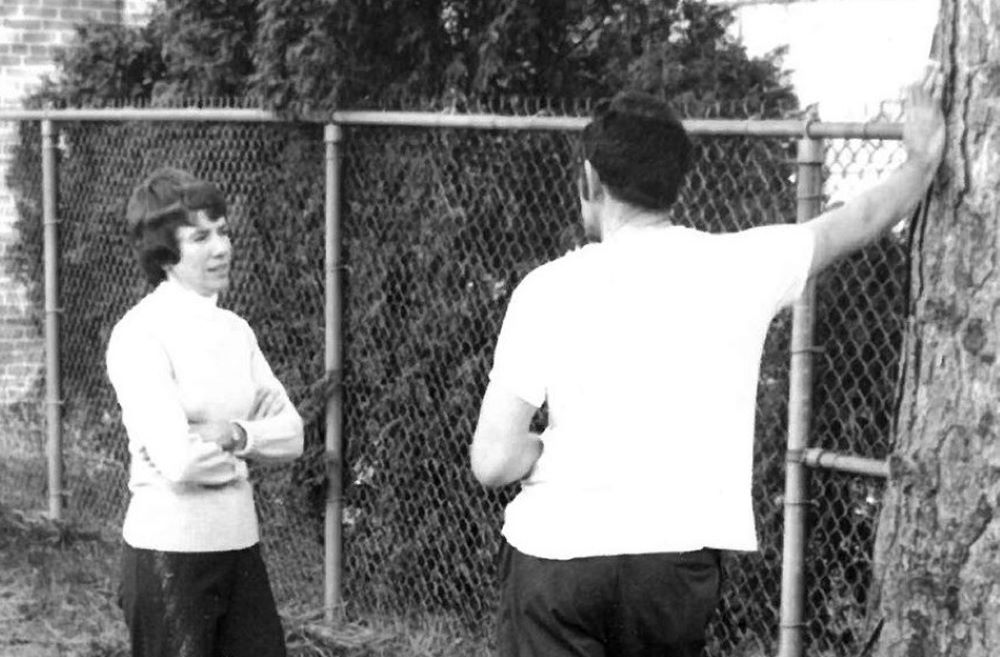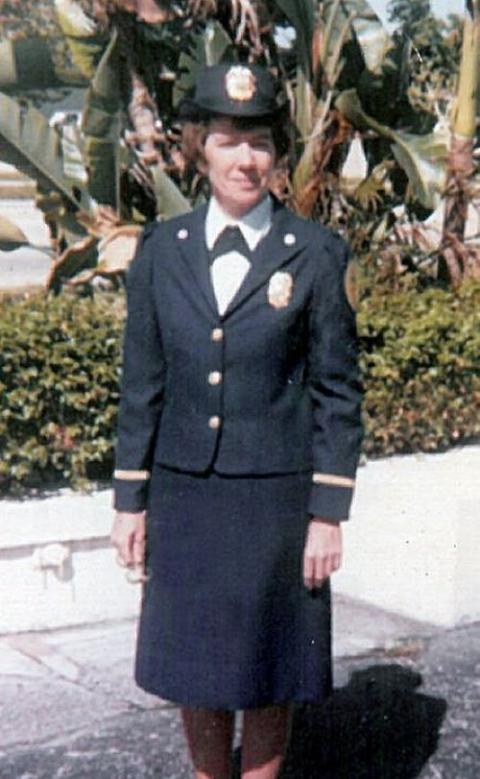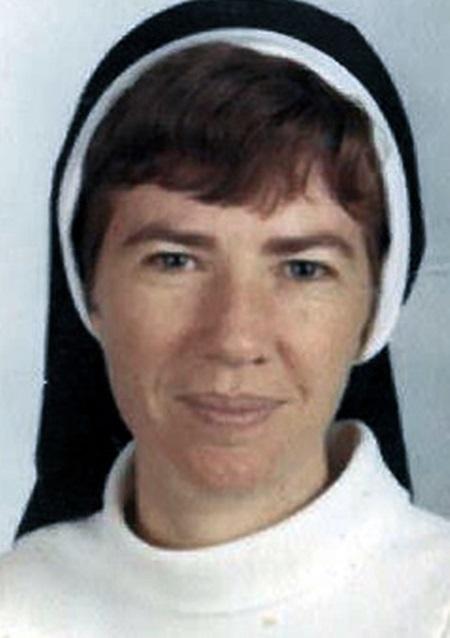
Adrian Dominican Sr. Beth Butler conferrs with an inmate at Southern Michigan State Penitentiary, Jackson, Michigan, in 1971. She educated inmates there for a decade/ (Courtesy of Beth Butler)
Adrian Dominican Sr. Beth Butler, 88, is not your typical sister. And while there is no such thing as a typical sister, how many can claim to have been a member of the Miami Police Department?
Though she has taught grade school, high school and college, Butler has also had a host of fascinating sidelines. For example, she spent 10 years teaching inmates in a maximum security prison. She served as a chaplain for a police force in one of America's most violent cities. There were also her stints as a probation officer and a security officer, not to mention jobs involving training police officers and probation officers.
The petite, soft-spoken sister approaches all students with compassion and a talent for looking beyond the superficial. Often, her students — whether in a college classroom or behind prison walls — respond in kind. They sense Butler wants them to succeed. When they succeed (which is often), they always remember her as a valued mentor.
In fact, on Oct. 13, 2023, Siena Heights University in Adrian, Michigan, named Butler an honorary alumni for her service during the 1980s. At that time, Butler was named the director of the university's criminal justice department and also taught classes. Decades later, her students still remember her as the professor who walked the walk.
"I really believed the students needed hands-on experience," Butler said. "We went to the institutions so they could see the reality of what they were learning in the classroom."
'My mother was a saint and my dad was a policeman. So, you put the two together and you get a nun in criminal justice.'
—Sr. Beth Butler
Butler holds a criminology degree from Florida State University and a master's degree in criminal justice from Michigan State University. While earning her master's degree, Butler had the opportunity to compare and contrast criminal justice systems in the United States and Europe. She emerged from this experience believing the United States has the best criminal justice system. Still, she thinks, there is room for improvement.
Butler has vast knowledge of how the criminal justice system is supposed to work in a perfect world. But, she realizes this world is far from perfect. Human beings fall through the cracks of a system that is supposed to work, but sometimes doesn't. In Butler's opinion, approaching justice solely from a textbook model does not give the student the whole picture.
"It is one thing to open a textbook," Butler said. "Let me tell you what it's really like."
Butler knows exactly what it's really like. Her father was a Detroit police officer and though she longed to become a police officer, her father discouraged her.
So, Butler did some thinking outside the box. Long before the term "hybrid job" came into vogue, a plan began to form in her mind. Why couldn't she combine her love of God and her obsession with law enforcement into a single seamless vocation? It didn't happen immediately, but when it did, her life was complete.
"My mother was a saint and my dad was a policeman. So, you put the two together and you get a nun in criminal justice," Butler said.
Butler knew she was called to become a nun when she attended Our Lady Gate of Heaven in Detroit in seventh and eighth grades. Years later, when she officially took her vows, she had the freedom to pursue her other passion. Indeed, Butler views being a nun as having the ultimate freedom.
"Our vows set us free. I am free to go at anybody's beck and call," she said. "If I had a husband and family I couldn't."

Adrian Dominican Sr. Beth Butler, pictured here in 1993, became the first female chaplain for the Miami Police Department in 1986. She quickly let people know that blood and guts didn't faze her. nor did the gallows humor officers shared. (Courtesy of Beth Butler)
After completing her education, Butler taught in grade school, high school and universities. Teaching was fulfilling to a certain degree, but there was something missing. She wanted to use her knowledge to serve where she believed it would matter most — in the real world.
So, in the mid-'70s when a young teacher was beaten and raped by inmates of Southern Michigan State Penitentiary, Butler felt compelled to take her place. For the next decade, she educated murderers, rapists and extremely violent and volatile criminals.
"It isn't unusual that a nun should go looking for God in the prisons, in police work, in my classes," she said. "He's everywhere and in everyone. There's no end to finding God."
In 1986, Butler sought out a new challenge. She became the first female — not to mention first religious sister — chaplain of the Miami Police Department. If the officers were skeptical about a sister being able to handle the blood and guts of a violence-ridden city, she soon set them straight. Blood and guts didn't faze her. Nor did the gallows humor officers shared. Butler had survived a decade teaching and interacting with violent offenders. She was no rookie.
When word got out around Miami about the nun chaplain, the local distillery of Blue Nun wine sent Butler a letter of congratulations, a dozen bottles of wine and a cardboard Blue Nun she proudly displayed in her office along with her father's handcuffs and billy club. Coincidentally, Butler's uniform happened to be blue, earning her the nickname "The Blue Nun." She took the good-natured ribbing in stride. She felt as if she had come home and was fulfilling her vows.

Adrian Dominican Sr. Beth Butler in 1975 (Courtesy of Beth Butler)
GSR: You were influenced by your father. What do you remember most about him?
Butler: My dad was a Detroit cop. I remember he would have the guys over. They'd go down the basement and play cards and tell stories. I'd be on the top step listening to everything. I was fascinated. You pick up information at some level without even realizing it.
And I was so proud of him. He'd take the bus home, get off the bus in his uniform, and walk down the street to the house. I went down to meet him. I guess the idea of being in law enforcement is in my genes. It's always there and it's exciting to me.
When I expressed interest in becoming a cop, he didn't really forbid it. He just didn't approve. That was back when there weren't any female police officers on the job. Now, he's probably rolling over in his grave.
I remember when I got my degree in criminology. I was sitting there with another sister. We were going on and on about laws and theories — really talking up a storm. My dad got up from his chair, went downstairs and came back with his billy club. He said, "There's more gosh-darn law in this club than all those theories."
Adrian Dominican Sr. Beth Butler received the Honorary Alumni Award from Douglas Palmer, president of Siena Heights University in Adrian, Michigan, on Oct. 13, 2023, Butler directed the university's criminal justice department and taught classes there in the 1980s. (Courtesy of Laura Harvey/Siena Heights University)
How did your two years at Our Lady Gate of Heaven School in Detroit influence your decision to become a nun?
I met the nuns, and I fell in love with them. I thought, "This is the life for me." But, the nuns told my mother: "Don't worry about her going to Catholic high school, Mrs. Butler.She's not really convent material."
When I heard that, I thought, "Well so much for that." But, they did say that if I still felt a calling after high school to come and see them. And I did.
While in college, you spent time in Germany studying criminal justice models. What did you observe?
Within the German prison system, prisoners are engaged in productive activity. They are often contracted out to work for private industries.
I thought it was good because it makes them feel that they were performing valuable work. They had a productive role. They took pride in what they were doing. And they were appreciated. I think they also felt they were giving something back to society.
Working in the criminal justice system as well as visiting and observing other systems in other parts of the world, has made me realize that we have the best system in the world. Here in the United States, I believe we have too many people in prison. But, our justice system tells us that we have justice for all, not just for some.
You describe your role as chaplain for the Miami Police Department as fulfilling. Why was that?
I was so excited to work as a chaplain. I loved it. I fit in. The chief wanted me to get to know the officers, and you don't do that sitting behind a desk. They want you in the squad car with the officers. It reminded me of my father and it stirred something in my soul.
What were some of your most memorable experiences while serving as chaplain for the Miami Police Department?
I participated in a sting. The officers would find an abandoned building and black the windows out. And then we have undercover guys. They would go out on the streets looking shabby. They had drugs ready to sell. Someone would come up to them — a buyer. The officer had a microphone in his pocket.
As soon as the officer turned the drugs over to the guy, he cuffed him and brought him back into where we were waiting. We'd take the pictures, take the evidence and put him in a holding room. After we got four or five, somebody would come and take them all to prison.
The helicopter unit was really exciting. We were tracking kids who had robbed an ice cream truck. There was no door; it was just a bar across my lap and he'd [the pilot] make a turn and I'd think, "Oh sweet Jesus." I called upon the presence of the Holy Spirit very often and thought of God as the co-pilot.
Advertisement
While serving as chaplain, you owned an Australian shepherd named Murphy. Please share a story about him.
Murphy was my personal dog [not canine patrol]. Not that I could ever train one, but I watched them work with the officers. It was voice control. And it was easy.
One evening, I ran in the house and left my briefcase in the car. Later that evening, I heard a car door slam. There was somebody out there breaking into my car. Murphy heard it and ran out to the porch. I opened the door, and said, "Go get him, Murphy."
Murphy took off after that guy; chased him down the street. The kid jumped a fence, but dropped the briefcase. I got my briefcase back.
Looking back on your life, what are your thoughts?
I had three brothers and a sister who were all military. Mom was with the American Red Cross and dad was in his police uniform. I have my uniform from the police department. My mom once said, "Oh good, we can all be buried in our uniform."
But being a nun is the Number 1 priority. I am a nun first.
On a sticker on the trunk I took with me to the convent were the words that have come to embody my philosophy of life: "To fall in love with God is the greatest of all romances. To seek him is the greatest of all adventures. But to find him is the greatest human achievement."






